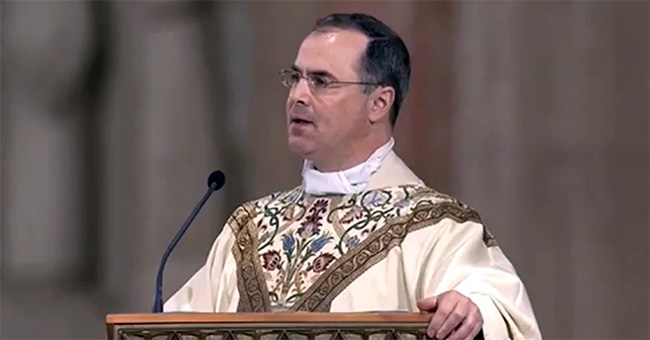At Father's Funeral, Fr. Paul Scalia Proclaims Jesus Christ to Entire Nation

These days, preaching on the Four Last Things—death, judgment, heaven, and hell—is almost as rare as a homily on Humanae Vitae. As a result, many Catholics now view a funeral Mass as a vehicle for “celebrating the life" of the deceased. Yet the Catechism of the Catholic Church says that a funeral homily must “avoid the literary genre of funeral eulogy and illumine the mystery of Christian death in the light of the risen Christ.”
With this modern tendency in mind, mourners who gathered at the Basilica of the National Shrine of the Immaculate Conception had reason to believe that Father Scalia was extolling his father, when he began his homily with these stirring words:
We are gathered here because of one man. A man known personally to many of us, known only by reputation to even more; a man loved by many, scorned by others; a man known for great controversy, and for great compassion.
But Father Scalia's opening remarks were followed by a passage that upended the congregation's expectations:
That man, of course, is Jesus of Nazareth. It is He Whom we proclaim: Jesus Christ, Son of the Father, born of the Virgin Mary, crucified, buried, risen, seated at the right hand of the Father. It is because of Him, because of His life, death and resurrection that we do not mourn as those who have no hope, but in confidence we commend Antonin Scalia to the mercy of God.
The homily radiated a son's deep love for his father. But Father Scalia chose to celebrate the blessings of God in the life of one man, who was a faithful husband and father.
We give thanks, first of all, for the atoning death and life-giving resurrection of Jesus Christ. Our Lord died and rose not only for all of us, but also for each of us. And at this time we look to that yesterday of His death and His resurrection, and we give thanks that He died and rose for Dad. Further, we give thanks that Jesus brought him to new life in Baptism, nourished him with the Eucharist, and healed him in the confessional. We give thanks that Jesus bestowed upon him 55 years of marriage to the woman he loved—a woman who could match him at every step, and even hold him accountable.
If you didn't read the latest headlines, you'd never guess that Justice Scalia's death was big news, triggering a political firestorm in Washington.
Yet the decision to set aside the deceased's impressive credentials served an important purpose: it reminded overheated politicians, commentators and voters on both sides of the partisan divide that politics is not ultimate. Faith, hope, and love are the only treasure we will be able to carry into the next life.
Father Scalia's beautiful and bracing words also offered a striking counterpoint to the celebratory remarks that serve as placeholders for real funeral homilies. The most disturbing example of this tendency that I can recall. took place at the funeral Mass for a young suicide victim. Before a congregation that included hundreds of young people, the pastor expressed his certainty that their friend was in heaven, having a good time. At the Rosary, his grieving father, a devout Catholic, was the only one to specifically request prayers for his son.
The pastor, no doubt, sought to provide support during a terrible tragedy. But his facile words were shocking, and he missed an opportunity to share the Church's deep spiritual and moral response to the mystery of human suffering and the Good Shepherd's merciful love for his lost sheep.
Indeed, the theological content of funeral homilies is even more important today. With fewer church marriages performed, a Catholic funeral provides an important catechetical opportunity to reflect on our mission on earth and God's desire that we freely choose to join him in paradise.
Father Scalia did note that there would be an upcoming memorial service, where the justice's family, friends and colleagues could celebrate his accomplishments and tell stories. The priest allowed himself one vignette, recalling his father's irritation one day, when he discovered that he had ended up in the confession line for Father Scalia. “As he put it later, like heck if I’m confessing to you,” remembered his son, who said the feeling was mutual.
Justice Antonin Scalia made his mark on the world, and his son had every reason to praise him. But that was for another day. On Feb. 20, as he celebrated the Holy Sacrifice of the Mass, Father Scalia prayed that God would purify his father of his sins and their consequences, and that he would be received into the Father's House.
Would Antonin Scalia prefer a homily with a more optimistic spin and a bit of family boasting?
Not likely.
“He treasured the Church’s ceremonies, especially the beauty of her ancient worship,” recalled Father Scalia. “He trusted the power of the Sacraments as the means of salvation—as Christ working within him for his salvation.”













